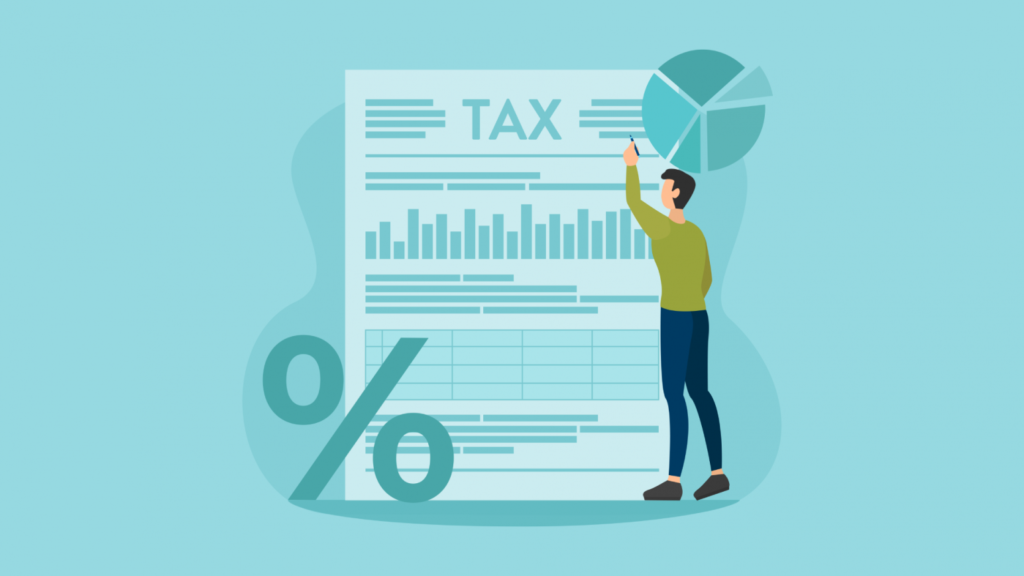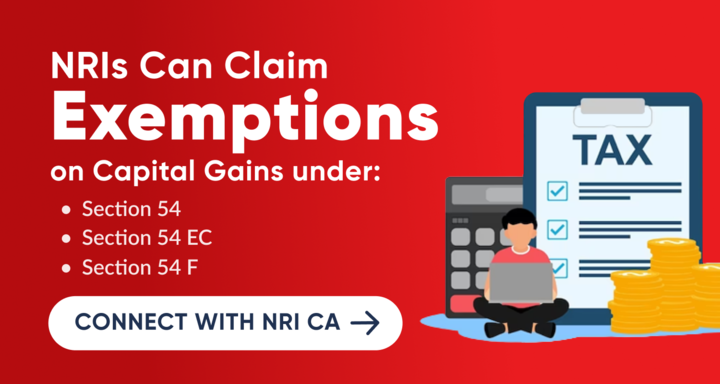As a non-resident Indian (NRI), you may be concerned about the tax implications of earning income in India. However, the Indian government has enacted several provisions that help NRIs to save income tax in India and encourage NRI investment in India. In this blog, we will discuss various tax benefits that NRIs can avail of in India.

Tax Benefits for NRIs in India: In Detail
Similar to resident Indians, NRIs can also avail various deductions and exemptions from their income in India. These deductions and exemptions are available under different sections of the Income Tax Act, 1961. Given below are varioous tax benefits for NRIs-
- Deductions Under 80C
Most of the deductions under Section 80 are also available to NRIs. For FY 2022-23, a maximum deduction of up to Rs 1.5 lakh is allowed under Section 80C from gross total income for an NRI individual.
- Other deductions under Section 80C for NRIs
Under Section 80C, NRIs can avail these following exemptions-
i. Life insurance premium payment
The premium must be paid for a policy in the NRI’s name, their spouse’s name, or their child’s name. The premium must be less than 10% of the sum assured.
ii. Children’s tuition fee payment
The tuition fee must be paid to any school, college, university, or other educational institution situated within India for the full-time education of any two children, including payments for play school, pre-nursery, and nursery.
iii. Principal repayments on loan to purchase house property
The deduction is allowed to repay the loan taken for buying or constructing a residential house property. The deduction is also allowed for stamp duty, registration fees, and other expenses to transfer such property to the NRI.
iv. Unit-Linked Insurance Plan (ULIP)
Investment in ULIPs offers twin benefits of insurance and investment under a single integrated plan. Premium paid towards own, spouse and children is eligible for deduction.
v. Investments in ELSS
NRIs can claim a deduction of up to Rs 1.5 lakh for investments made in ELSS. These funds invest primarily in the equity market in a diversified manner and offer the EEE (Exempt-Exempt-Exempt) benefit to taxpayers.
- Other Allowable Deductions
Besides the deduction that an NRI can claim under Section 80C, they are also eligible to claim various other deductions under the income tax laws, which have been discussed here:

1. Deduction from house property income for NRIs
An NRI can claim a standard deduction of 30% and benefit from an interest deduction from a home loan. NRIs are also allowed a deduction for principal repayment under Section 80C. Stamp duty and registration charges paid on purchasing a property can also be claimed under Section 80C.
2. Deduction under Section 80D
NRIs have the option to claim a deduction for the premium paid for health insurance. This deduction can go up to Rs 25,000 for self, spouse, and dependent children. Additionally, NRIs can also claim a deduction of up to Rs 25,000 for insurance of their parents (either father or mother or both). However, the deduction limit is increased to Rs 50,000 if the insurance premium is paid for resident senior citizens (self, family, and parents). It is important to note that insurance premiums paid for senior citizen NRIs cannot be claimed under Section 80D.
Moreover, NRIs can also avail of a deduction of up to Rs 5,000 for preventive health check-ups, within the existing limits allowed. For resident senior citizens, medical expenditure of up to Rs 50,000 can also be claimed, within the existing limits of Section 80D. However, it is necessary to note that the individual on whom the medical expenditure is incurred should not be covered under any health insurance policy.
3. Deduction under Section 80E
NRIs can claim a deduction on the interest paid towards an education loan under section 80E of the Income Tax Act. This loan could have been obtained for higher education of the NRI, their spouse, children, or a student for whom the NRI is a legal guardian.
The deduction amount is not limited and can be claimed for a maximum of eight years or until the interest is paid, whichever occurs earlier. It is important to note that this deduction is not applicable to the principal repayment of the loan.
4. Deduction under Section 80G
NRIs are allowed to claim a deduction for donations for social causes under Section 80G. Some of the donations are listed below:
a. Prime Minister’s National Relief Fund
b. National Defence Fund set up by the Central Government
c. National Sports Fund
d. Fund set up by a State Government for the medical relief to the poor
5. Deduction under Section 80TTA
Section 80TTA provides a deduction of up to Rs. 10,000 on interest earned from savings accounts held with banks, co-operative societies, or post offices.

Exemption on Sale of Property for NRIs
NRIs can avail exemptions from long-term capital gains under different sections of the Income Tax Act, namely Section 54, Section 54EC, and Section 54F. By claiming these exemptions while filing their tax returns, NRIs can also seek a refund of TDS (Tax Deducted at Source) deducted from their capital gains.
- Section 54 provides an exemption on long-term capital gains arising from the sale of a residential property.
- Section 54F provides an exemption on the sale of any asset except for a residential property. More details about Section 54 can be found in the related provisions.
- Additionally, Section 54EC allows an exemption when the capital gains from the sale of the first property are reinvested into specific bonds issued by the National Highways Authority of India (NHAI), the Rural Electrification Corporation (REC), Power Finance Corporation (PFC), and Indian Railway Finance Corporation (IRFC).
Double Tax Avoidance Agreement Treaty Benefits
India has signed Double Taxation Avoidance Agreements (DTAAs) with 80+ countries to avoid double taxation of income. As an NRI, you can take advantage of these DTAAs to reduce your tax liability. These agreements are designed to avoid the situation where the same income is taxed in two countries, which can happen if an individual earns income in one country but is a resident of another.
Deductions and Exemptions as per Union Budget 2023
According to the Union Budget 2023, Non-Resident Indians who have to pay taxes in India are eligible for several deductions and exemptions. But, this is only possible if they select the Old Tax Regime. If they choose to opt for the New Tax Regime, they cannot avail any deductions, other than standard deduction.

Conclusion
Under different sections of The Indian Income Tax Act of 1961, NRI taxpayers can avail several deductions and exemptions. But according to the Union Budget 2023, now the taxpayers can choose between the two regimes – New vs Old Tax Regime – when paying their taxes. So, if you are an NRI and want to claim deductions and exemptions, choose the Old Tax Regime because if you choose the New Tax Regime, you will not be eligible for any deductions, other than the standard deduction.
Contact SBNRI for availing tax benefits for NRIs in India
For queries related to NRI tax deductions and exemptions, you can CONTACT US. You can also download the SBNRI App to connect with our NRI Tax / investment experts and get end-to-end assistance related to NRI tax filing. SBNRI will also help you get a lower TDS Certificate.
FAQs
Given below are the taxable sources of income in India-
1. Any salary received in India
2. Any salary received for services carried out in India
3. Rental income received from a property in India
4. Capital gain if there is any transfer of property or asset in India
5. Income from deposits in India
6. Interest received on savings bank accounts, etc.
NRIs cannot avail of the following deductions available under the Income Tax Act 1961:
1- Investment under RGESS under section 80CCG
2- Differently-abled under Section 80U, Section 80DD and Section 80DDB
3- Investments which are unavailable to NRIs are listed below:
4- Senior Citizen Savings Scheme
5- National Savings Certificates
6- Public Provident Fund (PPF)



